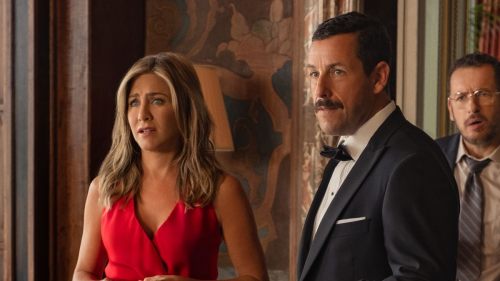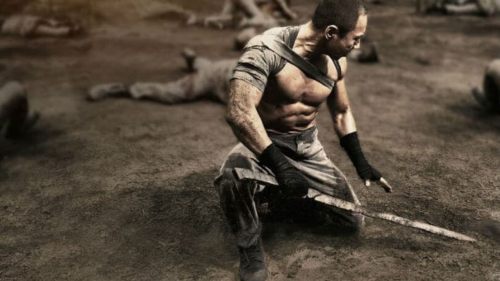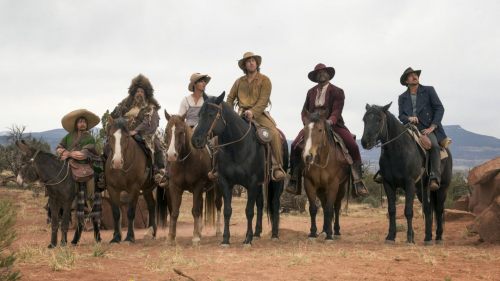Netflix’s HANDSOME DEVIL Will Give You Hope For The Future
Ireland has a reputation for being a bit backwards. Spuds and céilís and what have you (see: Ed Sheeran's ludicrously popular Galway Girl). When we voted to legalise gay marriage back in 2015, it was worldwide news. That pokey little island everyone pretends to be from (but is ashamed when they actually are) had shown itself to be surprisingly progressive and tolerant.
In the wake of the vote, a number of notable LGBT-themed films were released, including the captivating documentary The Queen Of Ireland (starring our most famous and beloved drag queen, Panti Bliss) and A Date For Mad Mary, a touching and frequently hilarious take on rural single-dom.
Handsome Devil, which drops on Netflix worldwide today, might be the most interesting example yet, ruthlessly skewering, as it does, a defining stereotype in Irish society by setting the story in a rugby-obsessed all-boys boarding school.
Our antihero is Ned (Fionn O'Shea), a self-involved emo kid cultivating a raging victim complex (as one teacher notes early on) thanks to years of bullying at the hands of fellow students convinced of his homosexuality (the worst thing in the world is being different, Ned's earnest voice-over intones).
Into his unhappy, isolated life comes Conor (Nicholas Galtizine, a British newcomer doing a spot-on Irish accent to rival Lucy Boynton's in Sing Street), a conventionally handsome and gifted sportsman who's had some mysterious trouble at a previous school. Against Ned's best intentions, the two forge an unlikely friendship and, spurred on by the interests of kindly teacher Mr. Sherry (Sherlock's Adam Scott, himself a proud gay man), soon find common ground.
It's a premise we've seen dozens of times before, in a variety of guises, but writer-director John Butler (previously known for uneven bachelor party comedy The Stag) injects his own highly personal take (he grew up gay and into sports and based the movie on his own experiences) with lashings of Irish humour (the local slang is left bravely unchanged for worldwide audiences) and a gutsy helping of genuine heart and emotion.
Pitched as a movie about rugby (snore), Butler is actually more interested in preaching a message of tolerance and acceptance. Although he doesn't shy away from showcasing his characters' ignorance (the boys make a sort of pig-like hooting sound to denote Ned's perceived homosexuality) he also teases out an "it gets better" scenario with just the right mixture of pathos and realism.
When an older gay man reassures his young cohort that things will settle down as everyone matures into adulthood, Butler holds the shot a beat longer as tears are held back. The younger guy knows he's being lied to, reassured so he'll keep pushing forward, but the advice is really for the two of them. Maybe they both need to be a bit stronger.
This sentiment, to be yourself no matter what, is slightly more heavy-handed elsewhere (characters literally repeat the same line to each other throughout the flick) but Butler's drawing of this world is so intimate and assured, it makes the sappier stuff easier to swallow. More than that, we want to believe things could change. Likewise, his two young leads ensure we're left guessing as to who's really "different". In the end, of course, it doesn't really matter.
A world in which rugby is the only thing that exists will be recognisable to anyone who made it through private education in Ireland (the movie was actually shot on location just down the road from my own secondary school). The on-field action, choreographed by sporting legend Brian O'Driscoll, is surprisingly engaging. Stirring speeches, delivered by all-too-invested teachers about winning no matter what and the movie's take-no-prisoners coach (Moe Dunford's horrible, but empathetic, Pascal), who'd rather turn a kid off doing anything besides rugby rather than accept he might have other interests, ring painfully true.
Wisely, Butler doesn't set his movie in any specific time period. Music choices are varied (the film's title refers to a song by The Smiths - a sly choice in itself), while not one of the featured teens brandishes an iPhone. When Ned lashes out, he uses his actual voice, rather than a social media post. The message is evergreen, as applicable to eighties kids as it is to millennials.
There is a sense that Handsome Devil is perhaps more relevant nowadays, particularly when Ned gravely intones, right at the top, that people do bad things primarily out of fear. Even Ireland, which has come so far and achieved much over the past decade, still refuses to legalise abortion.
Butler purposefully ends his story on a high note, his attitude hopeful. It's certainly what we need right now, in these trying times, even if, for those on the extreme margins of society, it may feel as unrealistic as the ludicrously sunny Irish summer days the movie seems to have been shot during.
Still, it's comforting to spend time in Handsome Devil's positive, reassuring glow. In an interview with The Irish Times, Butler offered the film as a message to his 16-year-old self and it's easy to see why. Particularly for kids currently struggling to make their way through school, it presents both an escape from the harsh realities of day to day life and a glimmer of hope for what's to come. Even if it does feel like a bit of a fantasy.



